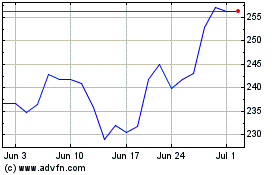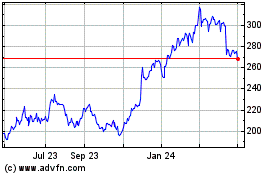Slack Deal Shows Big Tech's Handcuffs -- Heard on the Street
December 29 2020 - 6:59AM
Dow Jones News
By Dan Gallagher
One of the largest tech deals this year also shows why there
might be a lot fewer of them in the future.
Salesforce.com's $27.7 billion acquisition of Slack
Technologies, announced this month, was the largest to date for the
hyperacquisitive cloud-software provider, as well as the
second-largest deal so far in the software space -- behind IBM's
acquisition of Red Hat in 2018, according to Dealogic. The high
price Salesforce paid -- representing 26 times Slack's projected
revenue for the next 12 months -- led many to speculate that the
company faced competition on the deal.
But that wasn't the case. According to a regulatory filing last
week detailing the background of the merger, Slack Chief Executive
Stewart Butterfield said he received "informal messages" from
representatives of two large, publicly traded U.S. technology
companies on Nov. 25 -- the day The Wall Street Journal first
reported the talks between the two companies. But those reps only
"expressed a desire to discuss the market rumors," according to Mr.
Butterfield. No actual competing bids emerged.
That isn't a surprise. Besides the rather generous valuation
Salesforce was already offering, the most likely competition would
have come from tech giants that are already under intense
government scrutiny. Amazon.com and Alphabet's Google in particular
operate large cloud businesses that could have benefited from the
addition of Slack's popular messaging platform. But Google is now
the subject of several antitrust lawsuits from the federal
government and most states, while Amazon is dealing with its own
government probes into how it competes in the retail and
cloud-services sectors.
Microsoft, while not under the same level of scrutiny, was also
an unlikely bidder. The software giant has become Slack's primary
competitor with the popularity of its Teams platform, which has
been reporting superior growth numbers to Slack of late. Having its
own history with government crackdowns would also likely make
Microsoft think twice before spending top dollar to take out a
competitor. Other tech giants will be making similar calculations
for the foreseeable future.
Write to Dan Gallagher at dan.gallagher@wsj.com
(END) Dow Jones Newswires
December 29, 2020 06:44 ET (11:44 GMT)
Copyright (c) 2020 Dow Jones & Company, Inc.
Salesforce (NYSE:CRM)
Historical Stock Chart
From Mar 2024 to Apr 2024

Salesforce (NYSE:CRM)
Historical Stock Chart
From Apr 2023 to Apr 2024
